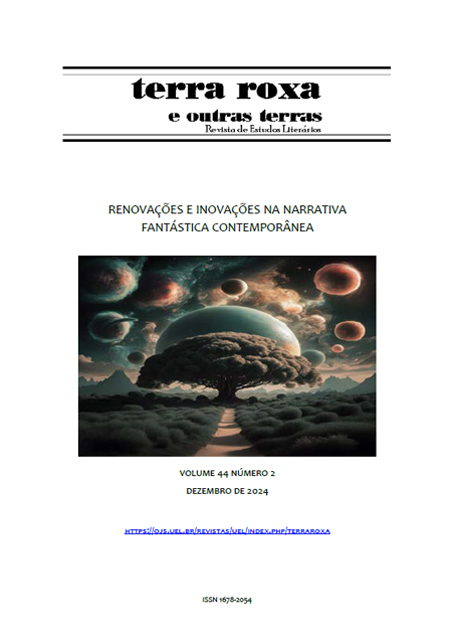Experimentations of the fantastic in contemporary indigenous narratives: enchantments and myths
DOI:
https://doi.org/10.5433/1678-2054.2024vol44n2p82Keywords:
fantastic mode, indigenous literature, enchantments, Maragua, mythAbstract
In recent decades, indigenous literature has been establishing its place in the Brazilian publishing market, offering a new perspective on the planet and the humans who inhabit it. Much of this literary production is grounded in a phenomenology related to the fantastic, due to the emergence of diverse meta-empirical elements, often expressed through enchantment and myth. The aim of this article is to associate these works with contemporary experiments in the fantastic genre, analyzing their aesthetic constitution and social impact, focusing on narratives from the Maragua people. The study examines three mythical narratives told by Yaguarê Yamã: "History of Kãwéra," "The Makukáwas," and "History of Mapinguary." The concept of enchantment, employed as a tool for narrative analysis, is rooted in an Amerindian and Amazonian cosmogony. This cosmogony is marked by the mysterious and magical forces of the Amazon's fauna and flora, which are capable of explaining frequent phenomena perceived as natural within this worldview, such as metamorphoses.
Downloads
References
ALMEIDA, Maria da Piedade Eça de. Mito: metáfora viva? Regis Morais, org. As razões do mito. Campinas: Papirus, 1988, 59-67.
BARTHES, Roland. Aula. São Paulo: Cultrix, 2007.
CANDIDO, Antonio. O direito à literatura. Vários escritos. Rio de Janeiro: Ouro sobre Azul, 2011. 171-193.
DORRICO, Julie et al. Literatura indígena brasileira contemporânea: criação, crítica e recepção. Porto Alegre: Fi, 2018.
ELIADE, Mircea. Mito e realidade. Trad. Pola Civelli. São Paulo: Perspectiva, 1972.
FURTADO, Filipe. Fantástico: Modo. E-Dicionário de Termos Literários. Coord. Carlos Ceia. Disponível em: http://www.edtl.com.pt.
JECUPÉ, Kaká Werá. A terra dos mil povos. São Paulo: Peirópolis, 1998.
JOLLES, André. Formas simples. Trad. Álvaro Cabral. São Paulo: Cultrix, 1976.
KRENAK, Ailton. Encontros com Ailton Krenac. Sergio Cohn e Idjahure Kadiwel, orgs. Rio de Janeiro: Azougue, 2017.
LOUREIRO, João de Jesus Paes. A arte como encantaria da linguagem. São Paulo: Escrituras, 2008.
LOUREIRO, João de Jesus Paes. Cultura Amazônica: uma poética do imaginário. Manaus: Valer, 2015.
LOUREIRO, João de Jesus Paes. Teatro e ensaios. São Paulo: Escrituras, 2001.
MUNDURUKU, Daniel. História de índio. São Paulo: Companhia das Letras, 1996. PESSOA, F. Mensagem. Coimbra: Angelus Novus, 2008.
ROMERO, Francisco Javier. La literatura indígena mexicana en búsqueda de uma identidad nacional. XXXVIII Congreso Internacional Instituto Internacional de Literatura Iberoamericana Independencias: Memoria y Futuro, Washinton, 9 a 12 de junio de 2010. Disponível em: https://www.academia.edu/28274588/%C3%AF_LA_LITERATURA_IND%C3%8DGENA_MEXICANA_EN_B%C3%9ASQUEDA.
TODOROV, Tzvetan. Introdução à Literatura Fantástica. Trad. Maria Clara Correa Castello. São Paulo: Perspectiva, 2004.
YAMÃ, Yaguarê. Contos da floresta. São Paulo: Peirópolis, 2011.
Downloads
Published
How to Cite
Issue
Section
License
Copyright (c) 2024 Marisa Martins Gama-Khalil

This work is licensed under a Creative Commons Attribution 4.0 International License.
Authors who publish in this journal agree to the following terms:
a) The authors retain the copyright and grant the journal the right of first publication, the work being simultaneously licensed under the Creative Commons Attribution-NonCommercial 4.0 International License, allowing the sharing of the work with acknowledgment of the authorship of the work and initial publication in this journal.
b) Authors are authorized to assume additional contracts separately, for non-exclusive distribution of the version of the work published in this journal (eg, publish in an institutional repository or as a book chapter), with acknowledgment of authorship and initial publication in this journal.
c) Authors are allowed and encouraged to publish and distribute their work online (e.g. in institutional repositories or on their personal page) after the editorial process, as this can generate productive changes as well as increase impact and citation of the published work (See The Effect of Open Access).
d) The authors of the approved works authorize the journal to, after publication, transfer their content for reproduction in content indexers, virtual libraries and the like.
e) The authors assume that the texts submitted for publication are of their original creation, taking full responsibility for their content in case of any objection by third parties.



















